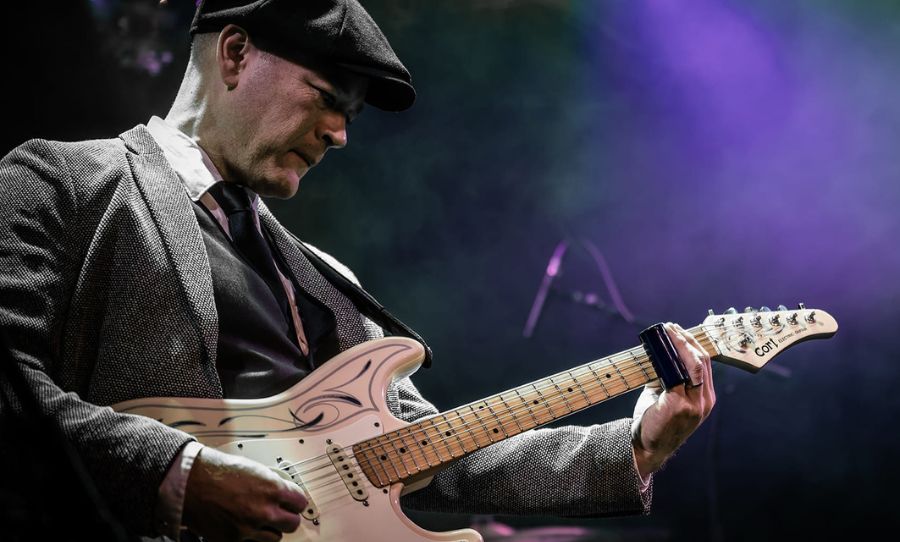Guns N’ Roses later clarified that the outburst came down to a technical failure. Rose’s in-ear monitors were feeding him only percussion – no guitars, no vocals, no bass – essentially a nightmare for a singer who relies on hearing the full mix to stay in tune and time. Once the problem was fixed, he returned to finish the show, but the moment had already escaped into the wild, where every pause, grimace and foot stomp becomes meme material.
Axl Rose has always been a perfectionist. Former bandmates have described a man who could spend hours obsessing over a single vocal take, who would cancel rehearsals if the lighting didn’t feel right, and who carried a kind of monastic focus on the craft even as the world branded him difficult.
That drive produced one of the most explosive debuts in rock history. Appetite for Destruction still stands as a template for controlled danger – all swagger and precision, a tightrope between blues, punk and pure hard rock. The success was so enormous that it warped everything around him. By the time Use Your Illusion I and II arrived in 1991, Guns N’ Roses had become a circus of stadiums, lawsuits and rumours.
Rose retreated from public view in the late 90s, disappearing for almost a decade while rebuilding the band with a rotating cast of players. The long-gestating Chinese Democracy finally surfaced in 2008 – a record born from obsession, technology, and a desire to prove that Axl Rose could still rewrite the rules. For all its divisiveness, it remains one of the most ambitious projects ever attempted by a single rock artist.
Watching the Buenos Aires clip now, there’s something tragic and strangely human in it. Axl Rose at 63, still chasing sonic perfection, betrayed by a faulty monitor. The man who once commanded a sea of 100 000 fans is suddenly alone in the noise, every symbol crash mocking the idea of control.
It’s easy to mock meltdowns, but any touring musician knows the terror of losing sound on stage. Multiply that by a career built on myth and expectation, and the moment becomes something else entirely – a collision between legacy and mortality. Rose has nothing left to prove, yet he still plays as if reputation is on the line every night. That kind of commitment doesn’t fade easily.
Part of the speculation around this latest outburst came from the arrival of new drummer Isaac Carpenter, who recently replaced longtime member Frank Ferrer. Some fans assumed tension between frontman and drummer, but the band quickly denied it. Carpenter, known for his work with Awolnation and Duff McKagan’s Loaded, has injected fresh energy into the live shows – sharper fills, slightly faster tempos, a renewed sense of urgency.
If anything, the Buenos Aires hiccup might have less to do with personality and more with technology – the hidden machinery of modern touring. When everything runs through wireless systems and synced timecode, one small glitch can unravel an entire performance.
Axl Rose’s story has always been one of extremes. He is the last of a breed who truly lived rock ’n’ roll as theatre – dangerous, messy, full of contradictions. For younger audiences discovering him through viral clips, it might be tempting to see only the tantrum. But behind every chaotic moment is a man who helped define what live performance could feel like.
Rose changed the way frontmen move, the way they scream, the way they build tension. Even his faults became archetypes. Without him there’s no blueprint for the unpredictable, bare-knuckled honesty that modern rock still chases.
After the Buenos Aires show, Guns N’ Roses continued their South American tour as planned. The setlists remained defiant, full of sprawling epics and snarling hits. Reports from subsequent concerts suggest Rose has been in fine voice – perhaps even sharper after the outburst. There’s a sense that these incidents, far from diminishing him, somehow reinforce the myth.
Because Axl Rose doesn’t exist in moderation. He thrives at the edge of collapse, in the tension between power and vulnerability. It’s what makes him both infuriating and irreplaceable.
For a generation raised on perfectly timed livestreams and pitch-corrected pop, a singer losing it on stage might seem unprofessional. But that’s exactly what makes Axl Rose’s moments so magnetic. They remind us that live music is human, volatile, and unrepeatable.
The meltdown in Buenos Aires isn’t the story of a man out of control. It’s the story of a performer still fighting for precision in a world that keeps breaking around him. The microphones might fail, the monitors might crackle, but Axl Rose will still walk out and demand that the sound hit like thunder.
Because that’s what he has always done. And even after all these years, when he raises his voice and the crowd roars back, the chaos somehow feels like home. And for the nerds among you, here are some facts and figures:
-
His full name is William Bruce Rose Jr., born on February 6, 1962, in Lafayette, Indiana.
-
He has been active as a performer since the early 1980s.
-
Guns N’ Roses formed in 1985, and Axl is the only constant member to remain through every lineup change.
-
The debut album Appetite for Destruction sold over 30 million copies worldwide, becoming one of the best-selling rock records of all time.
-
Axl’s vocal range spans roughly five octaves, from deep baritone growls to high-pitched screams – one of the widest of any major rock singer.
-
The Use Your Illusion world tour ran from 1991 to 1993, with nearly 200 shows across 27 countries.
-
That tour grossed over 60 million US dollars and set a new standard for rock spectacle in the early 90s.
-
The reunion Not in This Lifetime tour (2016–2019) was one of the highest-grossing in history, earning more than half a billion dollars from 5 million fans.
-
Axl’s early life was turbulent – he was arrested more than 20 times before the age of 20, mostly for minor offences and teenage chaos.
-
He was raised in a strict Pentecostal household and began singing in the church choir, where he developed the control and tone that would later define his voice.
-
Axl started experimenting with multiple vocal styles in high school, sometimes performing different characters in the same song.
-
He’s a self-taught pianist and wrote many of Guns N’ Roses’ most emotional songs at the keyboard, including November Rain and Estranged.
-
His perfectionism is legendary – Chinese Democracy took nearly 15 years and millions of dollars to complete.
-
At one point he reportedly employed a full team of engineers and producers to work simultaneously in different studios around Los Angeles.
-
Axl’s live shows are unpredictable, sometimes running hours late, sometimes transcendent – but always unforgettable.
-
He once joined AC/DC as their touring vocalist in 2016, earning respect for pulling off the impossible and keeping the tour alive after Brian Johnson’s hearing issues.
-
Despite decades of controversy, he remains one of rock’s most recognisable frontmen and one of its last true outlaws.
-
Guns N’ Roses have sold more than 100 million albums worldwide.
-
Axl is known for maintaining a largely private life offstage, rarely granting interviews and living far from the Hollywood spotlight.
-
Even at 63, he still performs with the same intensity that made him infamous – unpredictable, uncompromising, and utterly magnetic.


